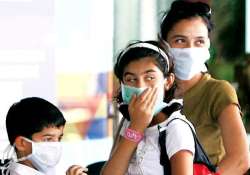Swine Flu: Death toll mounts to 201, Health Ministry takes stock of situation
New Delhi: Swine flue continues to wreak havoc in the country, with the death toll rising to 201 this year. This number is close to the number of H1N1 deaths in all of 2014.The Centre

New Delhi: Swine flue continues to wreak havoc in the country, with the death toll rising to 201 this year. This number is close to the number of H1N1 deaths in all of 2014.
The Centre reviewed the steps being taken by States to control and treat H1N1 (swine flu) cases.
Health Secretary B.P. Sharma held a meeting through video conferencing with senior health officials from Telangana, Kerala, Maharashtra, Gujarat, Rajasthan, West Bengal, Uttar Pradesh and Delhi and shared the instructions on dissemination of information on how to prevent the flu and what treatment
As the number of deaths due to swine flu is increasing, the concern of Health Ministry is getting concerned over the issue. The number of people who have died of swine flu so far this year is close to the number of H1N1 deaths in all of 2014.
According to Health Ministry data 201 people have died till February 2 this year comparison to last year's total 216. The most adversely affected states this year are Madhya Pradesh, Rajasthan and Gujarat in terms of deaths cases reported, though Telangana and Delhi have the most number of cases recorded.
At a meeting Tuesday, all states said there is adequate supply of drugs but some like Rajasthan asked for more protective gear for health staff.
Though Telangana with 668 cases and 34 deaths leads in incidence, the situation is grim in Madhya Pradesh where a third of the 54 patients who reported this year died. On the other extreme is Delhi, which has reported 510 cases but only five deaths. In Gujarat, 42 of the 320 swine flu patients have died.
Health Secretary Sharma spoke through video-conferencing to senior health officials of Telangana, Kerala, Maharashtra, Gujarat, Rajasthan, West Bengal, Uttar Pradesh and Delhi. Officials said the states have been asked to intensify their awareness programmes to ensure that symptoms do not go undiagnosed or unattended for a long time.
The Centre has stressed on creating awareness among the masses as part of the IEC campaigns, which includes engagement at the community level through inter-personal communication.